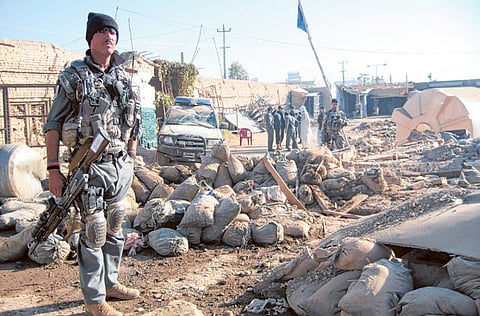Bombings across Afghanistan kill 20 people
Deaths come even as clashes with insurgents decrease as fighting season winds down

Kabul: Roadside bombs and a suicide bomber killed 20 people in a spate of attacks across Afghanistan on Thursday, officials said.
The deaths came even as armed clashes between insurgents and Afghan security forces have decreased as the fighting season winds down with the advent of cooler weather in the mountainous nation.
In one of the attacks, 10 civilians, including a child and four men, died as their vehicle struck a land mine in southern Helmand province. Seven other people in the group — which was heading to a wedding — were wounded in the blast, said Esmail Khan Hotak of the provincial security coordination center.
A suicide bomber on a motorcycle blew himself up amid a police patrol in the southern city of Kandahar, killing the three policemen and wounding two, said Ahmad Jawed Faisal, a provincial governor spokesman.
And five troops died when their convoy hit a land mine in eastern Laghman province, according to Sarhadi Zewak, also a governor spokesman.
Also Thursday, two boys were killed by a roadside bomb in Zabul province in southern Afghanistan. Deputy provincial chief Gulam Gilani Farahi said the device had probably been planted by insurgents targeting police officers patrolling the area.
Insurgents have been increasingly targeting Afghan authorities and security forces now that Nato is drawing down toward a final withdrawal of foreign combat troops in 2014.
Although the Afghan police and army have expanded rapidly to their planned strength of 352,000 members, they are plagued with low morale and a high desertion rate.
Meanwhile, the spate of so-called insider attacks by members of Afghan security forces against foreign troops and their own colleagues has undermined trust between international forces and the Afghan army and police.
Last month, the UN mission in Afghanistan urged the insurgents to end the use of roadside bombs, also known as improvised explosive devices or IEDs, saying they were by far the biggest killer of civilians in the conflict. The organization used the term in reference both to bombs detonated by remote control and land mines that go off when a vehicle goes over them.
But the Taliban rejected the assertion that their bombs were causing civilian casualties. Spokesman Zabiullah Mujahid later said the insurgents only use remote-controlled roadside bombs, which allow a bomber to choose the time of the blast and specifically target coalition troops and their Afghan allies — unlike devices that are planted and activated by pressure, from a car, for example.



